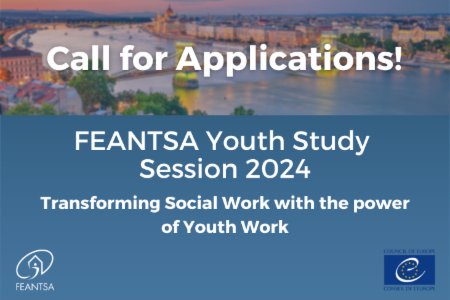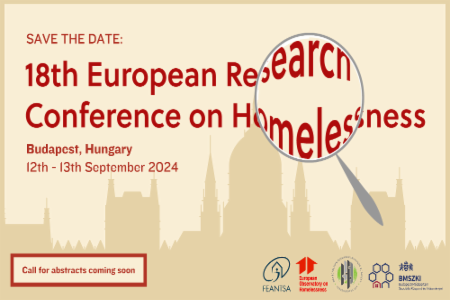Mental Health & Homelessness across Europe: Calling for Comprehensive, Sustainable & Inclusive Strategies
World Mental Health Day & World Homeless Day – October 10th, 2023
Download the statement here
Existing evidence reveal higher prevalence of mental health problems among people experiencing homelessness across Europe and within EU member states.[i] Not having safe shelter has a significant impact on people’s mental wellbeing. Mental health issues among children and young people experiencing homelessness are often diagnosed late or go untreated, leading to poor health outcomes, as documented in the UK and France.[ii] Accessibility issues for mental health care and a lack of professionals make the situation even more complicated. A recent report from Spain also reveals a close link between homelessness and mental health, with 7/10 homeless people at risk and 11.6% having a diagnosed mental problem.[iii] The report further highlights that women and young people are significantly impacted by mental health issues - nearly 80% of those aged 30 and under experiencing potential poor mental health. Asylum seekers, refugees and migrants living on the street, in insecure accommodation or in asylum centres were likely at high risk of having mental health problems in the aftermath of the COVID‑19 pandemic.[iv]
In an increasingly worrisome context for Europe’s mental health, in 2023 the European Commission has prepared a ‘Communication on a comprehensive approach to mental health’. For a truly comprehensive European Mental Health approach, FEANTSA enthusiastically supports the commission's initiative and calls for structural reform to address trauma, addiction, and health difficulties caused by harsh living situations, including support services for people experiencing homelessness.
On World Mental Health Day and World Homelessness Day – 10th of October FEANTSA raises awareness on the significance of housing as a social determinant of health, especially Mental Health, and proposes the following recommendations for a comprehensive approach to mental health:
1. Addressing homelessness while acknowledging its significant impact on mental health is crucial.
Ø Recognise the impact that homelessness has on peoples’ mental health in mental health initiatives: international studies conducted in the last 20 years have found lifetime prevalence rates for mental problems of between 60% and 93.3% among people experiencing homeless.[v] The trauma of not having a safe shelter has a huge impact on people’s mental wellbeing and should be addressed consequently.
Ø Tackle homelessness and ensure access to adequate housing through ‘Housing first’: ‘Housing first[vi] projects ensure that people have a safe home, and it has been proved to bring major benefits on mental health as it allows people to focus on treatment and rehabilitation and leads to better engagement with support services.[vii] Evaluations of housing first projects show positive outcomes around physical and mental health as well as substance/alcohol use.[viii] It is therefore necessary to ensure coordination between policies addressing housing, homelessness and mental health.
Ø Address specific challenges among people experiencing homelessness: certain groups encounter specific inequalities in accessing health services and their mental health is hugely impacted by homelessness and additional factors such as discrimination related to gender, ethnicity, age, against LGBTI people or discrimination and restrictions determined by migration status.[ix]
2. Gaining knowledge, learning lessons and generating community support while engaging with professionals and experts by experience.
Ø Learn from the Covid-19 pandemic lessons: this period has significantly affected people experiencing homelessness, in particular their mental health.[x] This was also a period of mobilisation from the part of policy makers who implemented several promising policies to protect people facing homelessness from the virus. Covid-19 served to highlight the importance of adequate housing as a social determinant of health.[xi] The lessons learnt in this period (such as sheltering people sleeping rough, allowing for unconditional and prioritised access to health care, etc) could also be relevant for the upcoming initiatives on mental health.[xii]
Ø Develop mobile/outreach mental health services: people facing homelessness are severely marginalised and excluded from society, reasons for which they often only seek healthcare in case of an emergency. Their healthcare can be fragmented and lack coordination and people may face stigma when attempting to access care. It is important that mental health supports, as well as health services in general are brought to the locations of people who need it.
Ø Involve community champions in mental health advocacy and people with experiences of homelessness: local champions, such as volunteers, students from schools, colleges, and other educational institutions, priests, and so on, could serve as a base for community and loco-regional acceleration and implementation of such initiatives.[xiii] People who have lived with Mental Health issues and have experienced homelessness may act as key stakeholders.[xiv]
3. Establishing and investing in enduring and inclusive mental health and healthcare systems
Ø Invest in a sustainable and resilient Mental Health Work Force across Members States: capacity building, training, and education of health professionals as well as other supporting disciplines including social workers and psychologists is a fundamental approach to bridge existing gaps in the mainstream of care pathway. Member States must put in place existing frameworks to support their health-care systems in this regard.[xv]
Ø Care for the ones who offer care: As part of their profession, frontline health workers are vulnerable to mental health issues themselves. Therefore, support services for the mental health and well-being of doctors, nurses, and other hospital workers, such as peer support groups or dedicated phone support lines, psychologists, and counsellors, must be offered and supported in Member States. This will aid them in dealing with the high levels of stress, fatigue, and psychological distress during these extremely challenging situations.
Ø Support health services to become more inclusive and develop knowledge against discrimination/stigma: due to stigma attached to people experiencing homelessness, they may often feel pre-judged and rejected by the health systems. The inflexibility of the system, which often fails to understand the trauma experienced by homeless individuals, leads to many not accessing healthcare, including mental health. Therefore, any EU initiative on mental health should (a) introduce measures at the level of the medical system for combating discrimination and stigmatisation of people experiencing homelessness (such as training, health inclusion projects) and (b) consider improving access to healthcare overall for marginalised people, as a first step in accessing mental health supports.
Ø Generate media momentum for mass Psycho-education initiatives: all Member States must encourage accountability and participation in the media in all of its manifestations. This comprises written and digital content, inspirational tales of resilience, and testimonies from those who have actually experienced homelessness and mental illness. This content must be multilingual, with an emphasis on broader engagement. This might enhance people's knowledge of and help de-stigmatize mental health problems and homelessness among different populations and subgroups.
[i] Schreiter S, Bermpohl F, Krausz M, Leucht S, Rössler W, Schouler-Ocak M,Gutwinski S: The prevalence of mental illness in homeless people in Germany—a systematic review and meta-analysis. Dtsch Arztebl Int 2017; 114: 665–72. DOI: 10.3238/arztebl.2017.0665
[ii]Crowley, 2012; Rosenthal & Lakhanpaul, 2020; Society for Adolescent Health & Medicine, 2018; Summerside, 2013 quoted in Homeless children and young people A review of interventions supporting access to healthcare services, Prepared as part of the European Platform for Investing in Children (EPIC) project, September 2021. Authors: Lucy Hocking and Emma Leenders
Hodgson et al., 2014 quoted in GRANDIR SANS CHEZ-SOI. Quand l’absence de domicile met en péril la santé mentale des enfants, UNICEF France and the Samusocial of Paris, 2022
GRANDIR SANS CHEZ-SOI. Quand l’absence de domicile met en péril la santé mentale des enfants, UNICEF France and the Samusocial of Paris, 2022 - https://www.unicef.fr/article/lunicef-france-et-le-samusocial-de-paris-alertent-sur-la-sante-mentale-des-enfants-sans-domicile/
[iii] Research report “Social exclusion and COVID-19: the impact of the pandemic on the health, welfare and living conditions of homeless people” December, 2021, Coordination: FACIAM Technical Secretariat Researchers: Esteban Sánchez Moreno, Doctor en Sociología (I.P) Iria-Noa de la Fuente Roldán, Doctora en Trabajo Social https://informecovidpsh.faciam.org/wp-content/uploads/2022/02/informe-Covid19_Faciam-EN-HR.pdf
[iv] WHO Apart Together survey, Preliminary overview of refugees and migrants self-reported impact of COVID-19, 18 December 2020
[v] Schreiter S, Bermpohl F, Krausz M, Leucht S, Rössler W, Schouler-Ocak M,Gutwinski S: The prevalence of mental illness in homeless people in Germany—a systematic review and meta-analysis. Dtsch Arztebl Int 2017; 114: 665–72. DOI: 10.3238/arztebl.2017.0665
[vi] Housing First Europe Guide, https://housingfirsteurope.eu/publication/guide-managing-transitions-in-housing-first-services/
[vii] Greenwood, Ronni, Byrne, Steven, O' Shaughnessy, Branagh,2022/11/30, National Housing First Implementation Evaluation Findings Prepared for the National Housing First Implementation Committee, DO - 10.13140/RG.2.2.13376.20482, https://housingfirsteurope.eu/wp-content/uploads/2023/01/NHFEFinalReport220922.pdf
[viii] Louisa Steele, Housing First and Homelessness Project Manager, Standing Together 2022, ‘Westminster Vawg Housing First Service Second Year Evaluation’
[ix] WHO Apart Together survey, Preliminary overview of refugees and migrants self-reported impact of COVID-19, 18 December 2020
Homeless children and young people A review of interventions supporting access to healthcare services, Prepared as part of the European Platform for Investing in Children (EPIC) project, September 2021. Authors: Lucy Hocking and Emma Leenders
[x] FEANTSA HOMELESS IN EUROPE MAGAZINE AUTUMN 2020 - THE IMPACT OF COVID19 (October 2020) and FEANTSA report The Impact of Covid-19 on Homeless Service Providers & Homeless People: The Migrant Perspective (March 2021)
[xi] FEANTSA statement - COVID-19: “Staying Home” Not an Option for People Experiencing Homelessness (March 2020)
[xii] FEANTSA research note COVID-19 Response and Homelessness in the EU, Ruth Owen and Miriam Matthiessen, 2021.
[xiii] Example of support initiatives in the homelessness sector with a focus on mental health: neunerhaus mental health practice in Vienna https://www.neunerhaus.at/blog/reden-wir-darueber/
[xiv] https://mailchi.mp/feantsa/feantsa-health-and-homelessness-newsletter-cvnlvrjzwz-1327108?e=cc68b54f44
[xv] Housing, homelessness and mental health: towards systems change, Australian Housing and Urban Research Institute Limited 2018, https://www.mentalhealthcommission.gov.au/getmedia/e1395547-292e-4236-be86-eaff9a4f1e92/Housing-homelessness-and-mental-health-towards-systems-change





